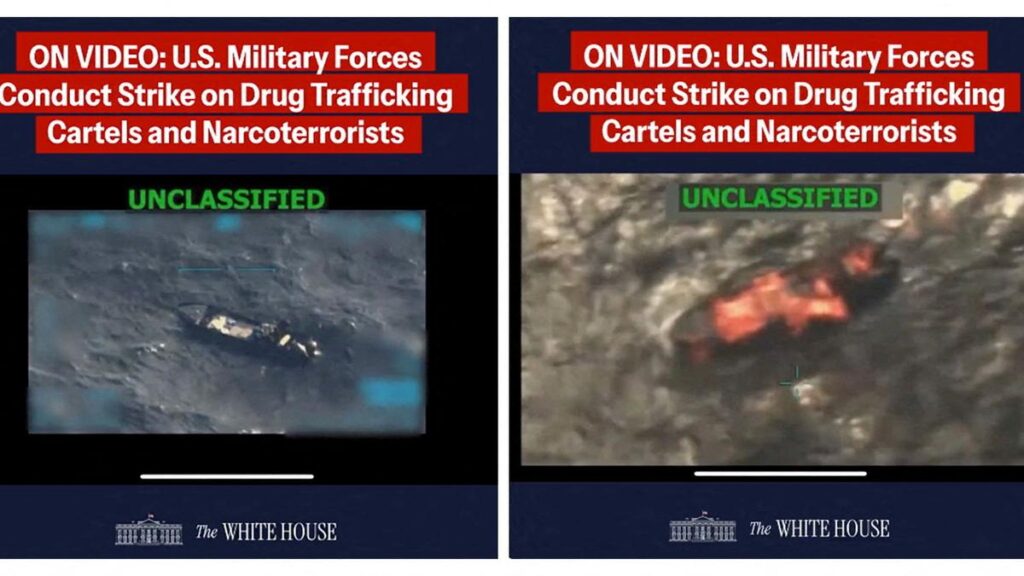**Trump Administration Declares Drug Cartels as Unlawful Combatants, Signals Armed Conflict**
President Donald Trump has declared drug cartels to be unlawful combatants and stated that the United States is now in an “armed conflict” with them. This assertion comes from a Trump administration memo obtained by The Associated Press on Thursday, October 3, 2025, following recent U.S. military strikes on boats in the Caribbean.
The memo represents an extraordinary expansion of presidential war powers, with Mr. Trump effectively declaring that drug trafficking into the United States amounts to armed conflict, thereby justifying the use of military force. This marks a new rationale for both past and future actions. According to the memo, “The President determined that the United States is in a non-international armed conflict with these designated terrorist organisations.”
Mr. Trump has directed the Pentagon to “conduct operations against them pursuant to the law of armed conflict.” The memo emphasizes that, “The United States has now reached a critical point where we must use force in self-defence and defence of others against the ongoing attacks by these designated terrorist organisations.”
This declaration signals a significant shift not only in the administration’s willingness to extend presidential authority in matters of war but also represents a potential pivot in Mr. Trump’s America First agenda, which traditionally favors non-intervention overseas. It raises pressing questions about how far the White House intends to exercise its war powers and whether Congress will step in to approve or restrict such military actions.
### Declaration Follows Strikes on Boats in the Caribbean
Last month, the U.S. military conducted three deadly strikes against boats in the Caribbean, which the administration accused of ferrying illegal drugs. At least two of these operations targeted vessels originating from Venezuela. These actions followed an unprecedented buildup of U.S. maritime forces in the Caribbean.
While the memo did not include a specific timestamp, it references a U.S. strike on September 15 that resulted in the destruction of the vessel, illicit narcotics, and the deaths of approximately three unlawful combatants.
White House deputy press secretary Anna Kelly stated, “As we have said many times, the President acted in line with the law of armed conflict to protect our country from those trying to bring deadly poison to our shores, and he is delivering on his promise to take on the cartels and eliminate these national security threats from murdering more Americans.”
The Pentagon referred questions about the memo to the White House. According to an anonymous source familiar with the matter, Pentagon officials briefed senators on the strikes on Wednesday. The classified briefing at the Capitol was perceived by several senators as advancing a new legal framework, raising concerns about the role of Congress in authorizing such actions.
### Legal and Congressional Concerns
The memo serves as the administration’s justification for the military strikes already carried out in the Caribbean, which have sparked controversy among lawmakers over their legality. It may also provide the basis for potential future military actions.
Details regarding the specific cartels targeted were scant. Although Mr. Trump has designated several Latin American drug cartels as foreign terrorist organizations, Pentagon officials were unable to provide a list of these groups during the briefing. This lack of transparency frustrated some lawmakers.
The memo describes cartel members as unlawful combatants, noting that while friendly foreign nations have made significant efforts to combat these groups, they have evolved into transnational operations conducting ongoing attacks throughout the Western Hemisphere.
### Bipartisan Objections and the Call for Congressional Approval
As the administration intensifies military operations in the Caribbean, lawmakers from both major political parties have raised objections. Many have urged Mr. Trump to seek congressional approval under the War Powers Resolution for these actions.
The first military strike, carried out on September 2 against what the administration described as a drug-carrying speedboat, resulted in 11 deaths. President Trump claimed the vessel was operated by the Tren de Aragua gang, which was listed as a foreign terrorist organization earlier this year.
Several senators and human rights organizations questioned the legality of these strikes, citing concerns about executive overreach, particularly since the military was used in an apparent law enforcement role. The Trump administration has yet to clarify how it assessed the boats’ cargo and passenger affiliations prior to the strikes.
Senator Jack Reed of Rhode Island, the top Democrat on the Senate Armed Services Committee, said, “The drug cartels are despicable and must be dealt with by law enforcement.” He added, “The Trump Administration has offered no credible legal justification, evidence, or intelligence for these strikes.” Reed, a former Army officer who served in the 82nd Airborne Division, emphasized the need for proper legal oversight.
—
The unfolding situation presents a complex intersection of national security, legal authority, and congressional oversight as the Trump administration pursues unprecedented military actions against drug cartels in the Western Hemisphere.
https://www.thehindu.com/news/international/trump-says-us-in-armed-conflict-with-drug-cartels-after-ordering-strikes-in-the-caribbean/article70119237.ece

